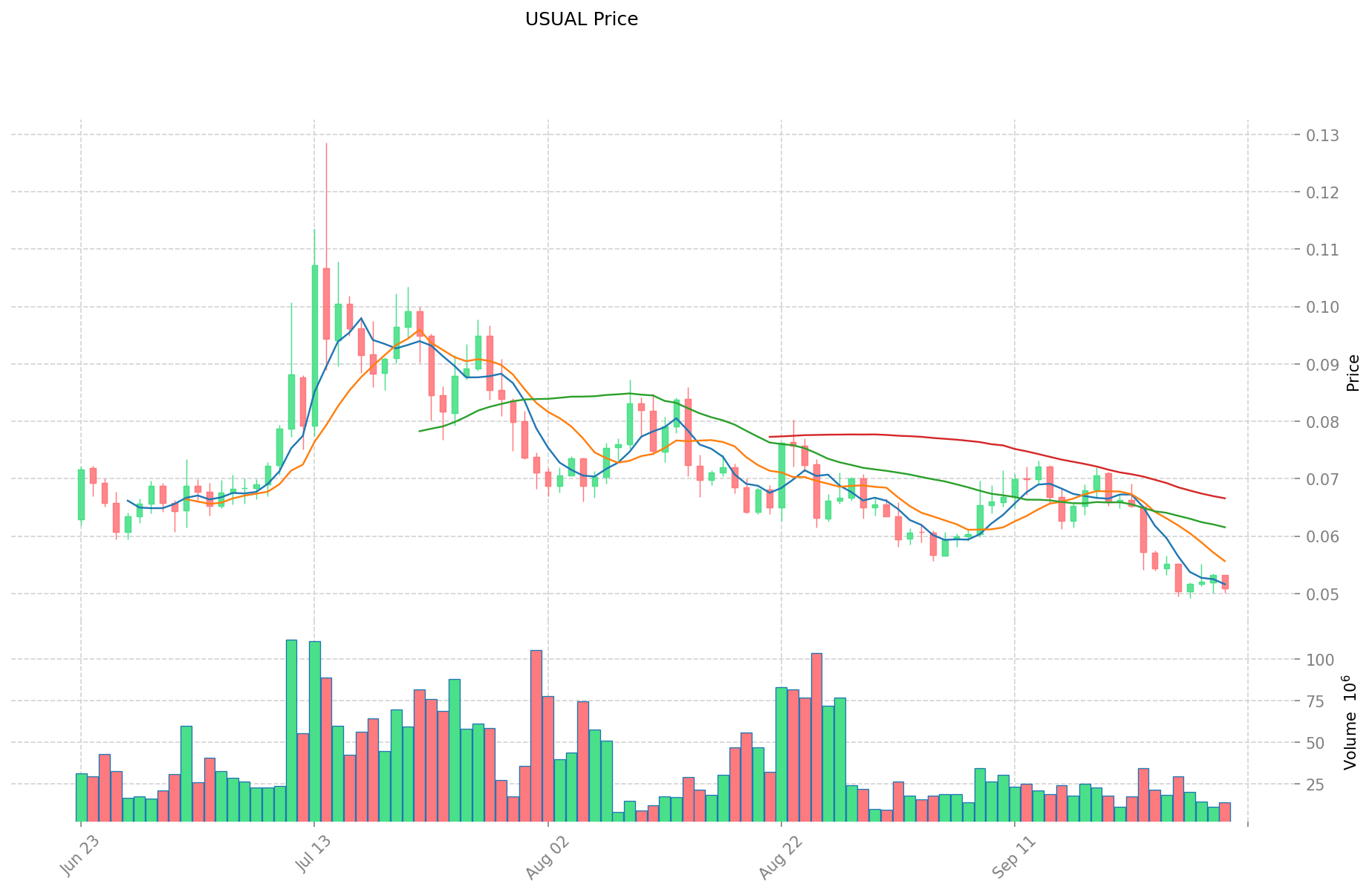What is USUAL: Understanding Software Usage Algorithms and Their Limitations
Usual's Positioning and Significance
In 2024, Usual (USUAL) was introduced as a secure and decentralized fiat-backed stablecoin issuer. It aims to address financial inequality and redistribute ownership and value through the $USUAL token.
As a decentralized stablecoin platform, Usual plays a crucial role in the DeFi and stablecoin sectors of the cryptocurrency market.
As of 2025, Usual has become an emerging player in the stablecoin market, with a circulating supply of over 1 billion tokens and an active community of 21,843 holders.
Origin and Development History
Background
Usual was created in 2024 to tackle issues of financial inequality and centralized control in the stablecoin market. It emerged during a period of growing interest in decentralized finance and stablecoin alternatives.
The project's goal is to provide a secure, decentralized stablecoin solution that redistributes ownership and value to its users. Usual's launch brought new possibilities for DeFi users and those seeking more equitable financial systems.
Key Milestones
- 2024: Mainnet launch, introducing a decentralized fiat-backed stablecoin platform.
- 2025: The USUAL token reaches its all-time high of $1.6555 on December 20, 2024.
- 2025: Ecosystem growth leads to listing on 28 exchanges, including Gate.com.
Supported by its community and development team, Usual continues to enhance its technology, security, and real-world applications in the stablecoin and DeFi sectors.
How Does Usual Work?
Decentralized Control
Usual operates on a decentralized network of computers (nodes) worldwide, free from control by banks or governments. These nodes collaborate to validate transactions, ensuring system transparency and attack resistance, which grants users greater autonomy and enhances network resilience.
Blockchain Core
Usual's blockchain is a public, immutable digital ledger that records every transaction. Transactions are grouped into blocks and linked through cryptographic hashes, forming a secure chain. Anyone can view the records, establishing trust without intermediaries.
Ensuring Fairness
Usual utilizes the ERC-20 standard on the Ethereum network for token transactions and governance. Participants maintain network security through various DeFi mechanisms, potentially including staking or liquidity provision, and may receive USUAL rewards.
Secure Transactions
Usual employs public-private key encryption to protect transactions:
- Private keys (like secret passwords) are used to sign transactions
- Public keys (like account numbers) are used to verify ownership
This mechanism ensures fund security, with transactions remaining pseudonymous. Additional security features may be implemented through smart contracts on the Ethereum network.
USUAL's Market Performance
Circulation Overview
As of September 30, 2025, USUAL's circulating supply is 1,048,664,295.5183752 tokens, with a total supply of 898,406,854 tokens.
Price Fluctuations
USUAL reached its all-time high of $1.6555 on December 20, 2024.
Its lowest price was $0.04915, occurring on September 26, 2025.
These fluctuations reflect market sentiment, adoption trends, and external factors.
Click to view the current market price of USUAL

Usual Ecosystem Applications and Partnerships
Core Use Cases
Usual's ecosystem supports various applications:
- Stablecoins: Usual provides a secure and decentralized fiat-backed stablecoin solution.
- Value Redistribution: The $USUAL token enables ownership and value redistribution within the ecosystem.
Strategic Partnerships
Usual has established partnerships to enhance its technical capabilities and market influence. These partnerships provide a solid foundation for Usual's ecosystem expansion.
Controversies and Challenges
Usual faces the following challenges:
- Market Volatility: The significant price drop from its all-time high of $1.6555 to the current price of $0.05015 indicates high volatility.
- Competitive Pressure: As a stablecoin issuer, Usual faces competition from established players in the market.
These issues have sparked discussions within the community and market, driving Usual's continuous innovation.
Usual Community and Social Media Atmosphere
Fan Enthusiasm
Usual's community shows signs of engagement, with 21,843 holders as of September 30, 2025. On X platform, posts and hashtags related to Usual contribute to community discussions.
Social Media Sentiment
The sentiment on X presents a mix of opinions:
- Supporters praise Usual's secure and decentralized approach to fiat-backed stablecoins.
- Critics may focus on the significant price decline and market volatility.
Recent trends show a challenging market sentiment, given the substantial price decrease over the past year.
Hot Topics
X users discuss Usual's key issues such as price stability, adoption rate, and its role in the broader stablecoin market.
More Information Sources for Usual
- Official Website: Visit Usual's official website for features, use cases, and latest updates.
- Whitepaper: Usual's whitepaper details its technical architecture, goals, and vision.
- X Updates: On X platform, Usual uses @usualmoney, covering topics such as technical updates, community activities, and partnership news.
Usual's Future Roadmap
- Ecosystem Goals: Expand the adoption of Usual's fiat-backed stablecoin solution
- Long-term Vision: Become a leading player in the decentralized stablecoin market
How to Participate in Usual?
- Purchase Channels: Buy Usual on Gate.com
- Storage Solutions: Use secure wallets compatible with ERC-20 tokens
- Participate in Governance: Stay tuned for any community decision-making processes
- Build the Ecosystem: Visit Usual's developer resources to contribute or build on the platform
Summary
Usual is redefining the stablecoin landscape through blockchain technology, offering security and decentralization in fiat-backed stablecoins. Its active community and clear vision make it a unique player in the cryptocurrency field. Despite facing challenges such as market volatility and competition, Usual's innovative spirit and its approach to value redistribution position it as an interesting project in the decentralized finance future. Whether you're a newcomer or an experienced player, Usual is worth watching and participating in.
FAQ
What is the full meaning of usual?
USUAL stands for Utility Swap Unified Asset Layer, a protocol designed to facilitate seamless asset swaps and utility token exchanges in the Web3 ecosystem.
What does its usual mean?
USUAL stands for Utility Staking Unified Asset Layer, a protocol designed to enhance utility and staking in the Web3 ecosystem.
What is the meaning of as usual?
As usual means behaving or occurring in the typical or expected manner, consistent with past patterns or regular habits.
What does going as usual mean?
It means proceeding in a typical or expected manner, indicating consistency with past patterns or normal operations.
Share
Content